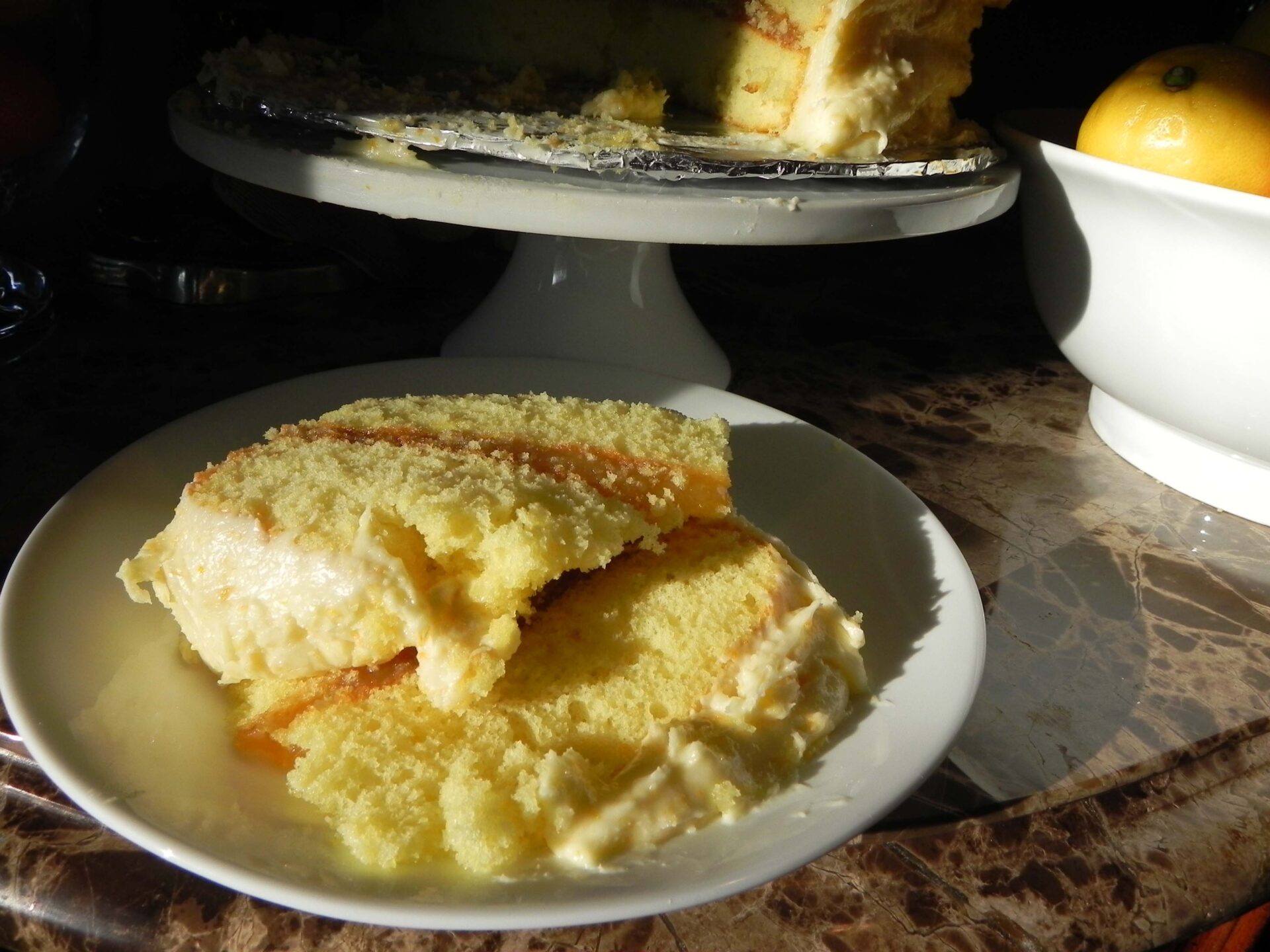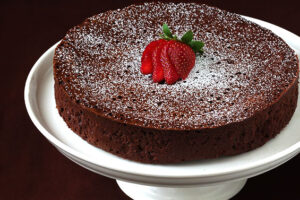SOUTHERNISM OF THE WEEK
Go put your face on: Refers to the need to improve one’s outward appearance either emotionally (happy face) or physically (makeup), implying that the person addressed with this admonition is not yet fit to be seen in public. Usually said by Southern mamas to daughters about the need to put on a little lipstick, mascara and powder before heading out to Kroger’s… or by Southern mamas to their sons about the need to hide a surly attitude before going forth into a situation… ANY situation…
THE TRUMPETS SHALL SOUND…
Here we are, approaching the Holy Week of Easter and Passover. Both religious holidays are times to be grateful for unearthly blessings and to commemorate the events with special foods shared among family and friends.
My Jewish friends have cleaned their kitchens to remove all traces of chametz (any food made from wheat, barley, rye, oats, spelt or their by-products); they must avoid any grain that would leaven during the seven Passover days commemorating the ancient Jews’ freedom from slavery and hasty departure from Egypt.
The meal following the Passover Seder ritual contains many of the best and most flavorful dishes of the year. The meal almost always starts with Haroset is a spice fruit-and-nut spread to be put on matzoh, the unleavened crackers baked exactly 18 minutes. Then comes a nice soup such as Matzoh Ball Soup made with savory chicken broth, followed by lamb or brisket. The accompanying roasted veggies such as asparagus with garlic, and potatoes, are topped off with an incredible dessert such as flourless chocolate cake. It’s the cake we’ll be discussing in this column.
My Christian friends have begun preparing desserts for celebrating Easter Sunday in commemoration of the Resurrection of Jesus. Happy colors and flavors are required, and almost no dessert could be considered “happier” than an old-fashioned Sunshine Cake.
Late 19th and early 20th Century variations of this beautiful citrus dessert are known from Florida to California as a Sunshine Cake. But in Virginia, it became known as Robert E. Lee Cake because it was said to be the favorite of the president of Washington College (now Washington and Lee University).
A recipe for it appeared in the 1879 cookbook, Housekeeping in Old Virginia; Contributions from Two Hundred and Fifty of Virginia’s Noted Housewives, Distinguished for their Skill in the Culinary Art and Other Branches of Domestic Economy, edited by Marion Cabell Tyree. In this and other early cookbooks, the cake ingredients were measured in pounds and egg weight, with equal weight of eggs and sugar.
FLOURLESS CHOCOLATE CAKE
1/2 c (1 stick) butter, softened
1 c plus 2 T white granulated sugar, divided
1 c ground almonds (I use a food chopper to grind them)
8 oz semisweet chocolate, melted in double boiler
4 eggs, separated
1 c whipping cream
1 tsp vanilla extract
2 c strawberries
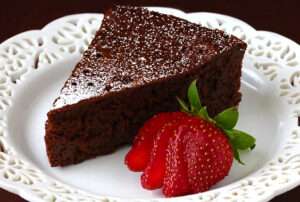 Preheat oven to 350ºF. Coat a 9-inch spring-form pan with cooking spray or butter and cocoa. Shake off the excess. Beat butter until smooth. Add 1 c sugar and beat until creamy. Add the ground nuts, chocolate and egg yolks, beating thoroughly. Beat egg whites until they form soft peaks. Stir 1/3 of the egg whites into chocolate mixture and then gently fold in the remaining egg whites.
Preheat oven to 350ºF. Coat a 9-inch spring-form pan with cooking spray or butter and cocoa. Shake off the excess. Beat butter until smooth. Add 1 c sugar and beat until creamy. Add the ground nuts, chocolate and egg yolks, beating thoroughly. Beat egg whites until they form soft peaks. Stir 1/3 of the egg whites into chocolate mixture and then gently fold in the remaining egg whites.
Scrape batter into prepared pan. Bake 35 to 45 minutes or until toothpick inserted in center comes out nearly clean. Let cool in pan for 30 minutes, then release the sides and slide cake onto a serving plate. Combine cream, vanilla and 2 T sugar, beating until soft peaks form. Top cake with whipped cream and strawberries.
SUNSHINE (Robert E. Lee) CAKE
The quantity of eggs in this cake ranges from 8 to 12, and the types of fillings and icing vary according to the cook. I substitute pre-made lemon curd for the traditional lemon filling. If making homemade lemon filling, make it before the cake and refrigerate until time to use it.
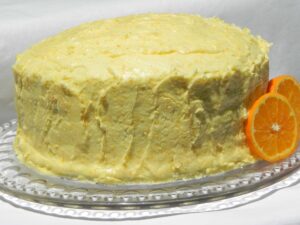 2 c plain flour, sifted (or 1 c plain flour, 1 c pastry flour)
2 c plain flour, sifted (or 1 c plain flour, 1 c pastry flour)
1/2 tsp cream of tartar
1-1/2 tsp baking powder
8 large or 10 medium eggs, room temperature, separated
2 c sugar
1 T grated lemon zest
1/4 c fresh lemon juice
One or two (10-oz) jars of lemon curd
Lemon-Orange Frosting
Preheat oven to 350˚F. Grease and flour two 9-inch cake pans. In medium bowl, sift together the pre-sifted flour, with cream of tartar and baking powder. Set aside. In large bowl, beat egg yolks until thick and creamy. Add in sugar, a little at a time, beating until smooth and pale yellow. Stir in lemon zest and lemon juice.
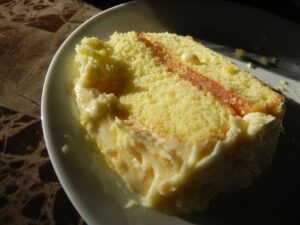 Gently fold in the dry ingredients until well mixed, using a wooden spoon and folding only in one direction. Beat egg whites in chilled bowl with very clean beaters until stiff peaks form. Fold one-third of the egg whites into batter, and gently fold in remaining egg whites, folding only in one direction, until batter is uniform in color. Spoon batter into prepared pans.
Gently fold in the dry ingredients until well mixed, using a wooden spoon and folding only in one direction. Beat egg whites in chilled bowl with very clean beaters until stiff peaks form. Fold one-third of the egg whites into batter, and gently fold in remaining egg whites, folding only in one direction, until batter is uniform in color. Spoon batter into prepared pans.
Bake about 20-25 minutes, until cake begins to pull away from pan sides. Remove from oven. Cool pans on rack about 10-20 minutes. Loosen edges with knife if needed, turn out onto wire cooking racks to completely cool. Make frosting while cake cools.
The cake may be completed with frosting as filling or with lemon curd as filling, and it may be made as a two-layer or four-layer cake. If making a two-layer cake, once cooled, spread one jar of lemon curd on the first layer and to with the second layer.
To convert the cake from two layers to four, use a long serrated knife to cut each layer horizontally in half. Spread lemon curd between each layer. There will be some left over. You may wish to secure the layers with wooden skewers inserted near middle (avoid cracking the layers). Spread lemon-orange frosting on sides and top of cake. Refrigerate, covered until use.
LEMON-ORANGE FROSTING
This makes enough to frost and fill a two-layer cake, or to frost the top and sides of a four-layer cake.
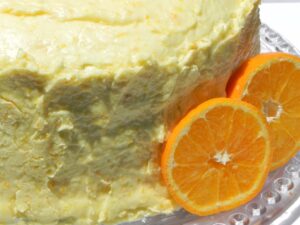 1/2 c (1 stick) butter, room temperature
1/2 c (1 stick) butter, room temperature
1 T grated lemon zest
3-4 T grated orange zest
2 T lemon juice
6 c sifted confectioners sugar
4 T fresh orange juice
Beat butter until creamy, beat in the zest and lemon juice. Stir in powdered sugar and orange juice, in 4 segments. Continue beating until smooth. If the frosting is too thick to spread, add more orange juice. Use spatula to cover sides and top of cake.
Laurie Triplette is a writer, historian and accredited appraiser of fine arts, dedicated to preserving Southern culture and foodways. Author of the award-winning community family cookbook GIMME SOME SUGAR, DARLIN’, and editor of ZEBRA TALES (Tailgating Recipes from the Ladies of the NFLRA), Triplette is a member of the Association of Food Journalists, Southern Foodways Alliance and the Southern Food and Beverage Museum. Check out the GIMME SOME SUGAR, DARLIN’ website and follow Laurie’s food adventures on Facebook and Twitter.
